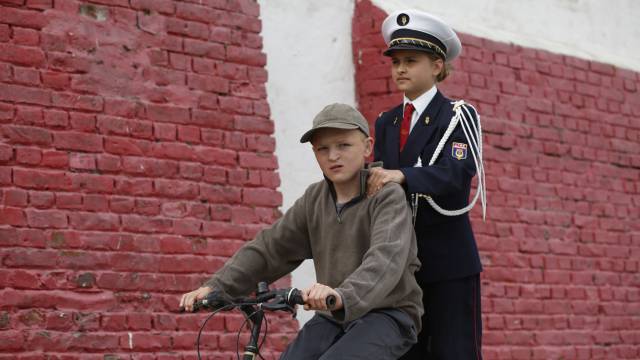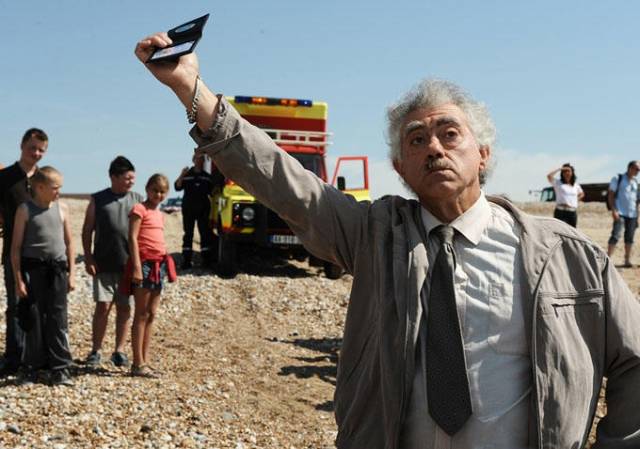

Bruno Dumont has become one of cinema’s strangest humanists, his characters are always flirting with tragedy or on the verge of sinking under heavy spiritual crises, and yet the filmmaker doesn’t seem to enjoy torturing them in the same way other auteurs do. Instead his films tend to surprise because of empathetic they are, which is not to say that they are sentimental in any single way. A perfect example of this is Li’l Quinquin (read our review here), his epic crime miniseries set in a small town in Calais, where a myriad of characters become connected after a series of brutal murders start occurring. Where other filmmakers would have made the crimes the center of the plot, Dumont focuses on the issues each of his characters are dealing with.
There’s the pint sized protagonist (Alane Delhaye) who is torn between staying a child or embracing impending adulthood, there’s also Commandant Van der Weyden (the excellent Bernard Pruvost) an existentialist detective who more often than not forgets the case, in order to try to fix the social and moral issues around him, there’s also singer Aurélie (Lisa Hartmann) who is obsessed with the idea of escaping her town, and her little sister Eve (Lucy Caron), the object of Quinquin’s affection.
Dumont effortlessly directs professional and nonprofessional actors to create a world filled with surreal strokes of absurdity that for some reason make it hit even closer to home. It’s funny without ridiculing the characters and profound without patronizing its audience, and as such it’s no wonder it ended at the top of Cahiers du cinéma’s list of the Best Films of 2014. We recently spoke to director Dumont about Li’l Quinquin and how it ties into the rest of his cinematic universe.

You once said that comedy was “immediate entertainment” and then also referred to television as a medium used to deliver “direct truth”. Is this why you did Li’l Quinquin as a miniseries instead of a film?
I didn’t make that request, it was just an opportunity that came to me and I hadn’t done a comedy before, so it was a great opportunity for me to try and experiment with new things.
Did you have to make any compromises between your usual way of filming and TV?
They didn’t want Cinemascope, among their restrictions was to use the TV format and also that we had to cut the series into four episodes, but then everything else was done my way.
What would you say the film loses between formats? Seen as a film it feels like a huge slice of time, while the miniseries divisions makes it feel more like a novel with very clear chapter divisions.
I had the whole film made and then just decided to cut it into the four parts they had requested, similarly if they had wanted six parts, I would have cut it into six. To begin with I had the three hour and twenty minute film, which is how I wrote the screenplay too.
Perhaps I’m just being a big nerd, but I was very curious about the fact that the song Lisa sings in the film was used exactly four times, once per chapter.
Did you count them? (Laughs)
Yeah. It appears in the church, in the farm, when the kids sing it and then once more. So when you said that you didn’t envision this as a four part series made me think then this was a very interesting coincidence.
It’s no coincidence, I didn’t think of it that way, but I planted a few seeds along the way and once it came to fruition I just cut. I wanted to use the song throughout the film in as many ways as possible.
The song sounds like something out of the 90s...
Lisa Hartmann, the singer/actress in the film wrote the song, I wanted her to write an English song, something along the lines of what you’d typically hear in a song competition show like The Voice, so I asked her to do it in English and something reminiscent of what you’d see on TV. When I was directing her, I’d give her instructions to go all the way, and have her use her voice in an exaggerated way.
With her character too I felt you made the film’s most important observation about our culture which is that in order to appear on television you have to either win a singing competition or be brutally murdered.
Actually remember she makes a remark to the young black man, so the idea is that she gets punished, eaten by the pigs, as if that was the devil’s will.
Even though most crime films are about finding out who the killer is, watching your film, by the second hour I didn’t care who was the killer, and just wanted the film to go on. Was that your way of making the audience an accomplice and show how we devour the news without ever developing empathy?
It’s almost like a satire making fun of police shows. Everything is falling apart and exploding, from the actual plot, to the kids and the policemen. Like you said you don’t really care anymore about who committed the crime, because everybody’s just going crazy.

The second Alane Delhaye shows up I thought he looked like a tiny James Cagney. How did you find him?
(Laughs) I really like people with very particular faces, people with interesting faces like the ones we saw in classic movies from the 40s, like you mentioned James Cagney. Also it was about chance, Alane was just there, and I make the crucial casting decisions, so when I met him he was very shy, kind of awkward, he wouldn’t talk...and his character allowed him to free himself from all that.
Alane also looks a lot like David Douche from The Life of Jesus in which his gang had motorcycles as opposed to Quinquin’s bicycles…
Yes, it’s all connected.
Li’l Quinquin is even an expansion of Humanité. Can you elaborate on how all your universes are connected?
It’s not something that I have to think about, it’s already within me. I don’t reuse these things, they are just who I am. When I do something like comedy, I’ll end up doing the same thing, because it’s my style.
You keep referring to this as your first comedy, but all of your films are actually very funny.
I agree (smiles) but maybe Li’l Quinquin will make the others look funnier in retrospect. Once people see this, they’ll realize the other ones were funny too.
The only thing the young people and older people have in common in Li’l Quinquin is extreme xenophobia.
Yes, it’s a very French thing. America had the cowboys and Indians, France has racism towards Northern African immigrants.
I’m not sure where this town in the film is exactly, but we see it’s a town filled with old WWII bunkers and Quinquin even finds grenades he collects, so this is literally a town on the verge of exploding.
The Germans had built a wall, called the Atlantic Wall and it was in this region in Calais, because they thought it was where the Americans would arrive, but they ended up landing in Normandy, so there were a lot of ruins in Calais, which is why all these bunkers are here.
This must have certainly increased the paranoia in this region.
But that was only during the Occupation, it’s not necessarily linked to current events. People that live there are used to foreigners arriving, but are still racist when it comes to Northern Africans.
I thought of this as a location that had been frozen in time.
All provincial France is like this, there’s a folklore to how they live, how they look, how they talk and it’s always going to be there. It’s how they are.
There are only about three scenes shot in interiors, and I wondered if it’s because the houses are so full of secrets that you’d rather keep us out safe in the open?
No, it was just a practical thing (laughs). Shooting in interiors is more complicated because you have to light it and prepare more things, also for contrast between night and day.
What are your feeling about people over-interpreting the meaning of your work?
No, it’s completely normal. If you’re in the audience you should have all these questions about what everything means, in your case you get to ask me all those questions, but not everybody can. I think audiences are very hyperactive about understanding the meaning of things, so in a way I leave clues in the story on purpose, so I’m not surprised about your questions.
Besides the direct visual reference to Rubens, what were some other visual influences in the film?
I love painting so I use a lot of painting references, even the name of the Commandant, is the name of a very important Gothic painter, Madame Campin’s name too is the name of a French painter.
Speaking of references, Bernard’s performance seems like a pastiche of Chaplin, Groucho Marx and many other famous comedians.
That’s your role as a spectator, you project certain ideas about what the characters remind you of and what they mean to you. You say Charlie Chaplin, but audiences in France said Michel Simon, who was another great comic. So maybe it’s different depending on the culture. I’m interested in audiences, so I love hearing things like these. I’m not making a movie just to make one, I learn a lot from reading articles about them.
Li'l Quinquin is playing a limited theatrical engagement at The Film Society of Lincoln Center. The series is also available on Fandor.